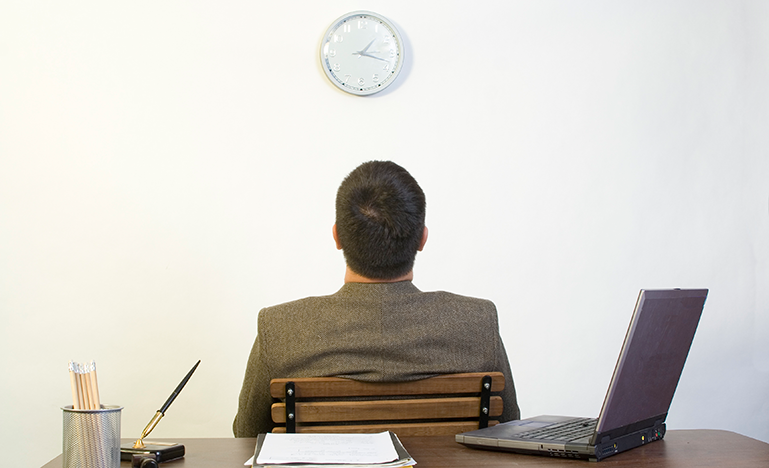Later never comes
It’s time to stop procrastinating. Here’s how to do it.

As a busy lawyer with an overflowing to-do list, it can be easy to put off tasks to another day. But procrastination is not a good habit to fall into.
The key for new lawyers is to learn the skills to help you manage your practice as efficiently as possible, says Allison Wolf, president of Shift Works Strategic Inc., a lawyer coaching service based in British Columbia.
"A strong practice management foundation will help you get your work done in good order and not be fighting fires that you have created yourself, " she says. "Law is challenging enough without getting in your own way."
Wolf has some tips for lawyers on how to avoid procrastination:
1. Examine the tasks you put off
The first step, according to Wolf, is to determine what sort of tasks you procrastinate on.
One of the essential habits that lawyers should have is to create a to-do list regularly, she says.
"A great way to determine what you are procrastinating about is to notice what is not getting done on your to-do list," she says. "The answer about what to do about it is going to change depending on what it is that you are procrastinating about."
2. Determine why you procrastinate
Once you have determined what specific tasks you can't seem to get finished, Wolf recommends considering why you are procrastinating.
For example, Wolf says that some lawyers procrastinate files that are no longer urgent.
"One lawyer I know gets his files almost done. They're not urgent anymore. It's just that final little thing, and it doesn't get done because it's not urgent," she explains.
Some lawyers also procrastinate on files or tasks that are stressful.
"These are the files that really stress you out either because the client is a difficult person and it will be a hard phone call to have or you don't know the answer, and you don't know what to do," Wolf says.
Another reason that lawyers procrastinate is that they get distracted, says Wolf.
"You can get really excited by the file that has just come in," she says. "So whatever is new and shiny is what gets your attention."
3. Identify your thinking traps
Wolf recommends that lawyers then identify what thought processes are causing them to procrastinate.
If they are, for example, putting off doing the last step of a file that is almost finished, she says that the "thinking trap" could be their preconception that, "I could do that later. I want a block of time to get that completed."
But, Wolf says: "In a busy legal practice, later never comes and you never get a big block of time."
4. Prioritize and focus
As a practising lawyer, there are often multiple tasks competing for your attention. But Wolf says it's essential to prioritize the tasks and make a decision about which one to focus your attention on.
Wolf recommends that you "look at the things that you are procrastinating about and think what is the most important thing to do first. If there are three things you are procrastinating on, think: What is going to have the biggest impact either for me or for somebody else if I get this moving?"
5. Figure out the precise next step
"Another good strategy if you are procrastinating a very important task, is to think very carefully of what is the most precise small next step," says Wolf.
She says that it is important for lawyers to have a written to-do list. "Do not keep your action items in your head. And, as much as possible, keep the to-do list to the next actionable step, not the project name, but the thing that needs to get done or what the next step is on the larger project," Wolf adds.
She recommends that you put that precise step on your to-do list and ideally aim to do it first thing in the morning.
"Look at those things on your to-do list that are written like a project and not as a precise step, says Wolf. "Break down your items into precise next steps and just get the next step done and then write down the next step and get that done."
6. Take 10 minutes
Wolf recommends that every day you take 10 or 15 minutes to dedicate to a task that you are procrastinating over, such as a phone call you have been putting off, some filing that needs to be done or the next small precise step in one of your "dog files."
"You just slowly chip, chip, chip away at it and keep moving it along and moving it along," she says. "Then put a check next to it on the to-do list and the next day you attack it again."
She says it's crucial that lawyers not wait until they have got a long stretch of uninterrupted time.
Instead, she recommends taking 10 minutes between two things and just get started.
Wolf refers to this strategy as "running a dash."
7. Realize the goal is not perfection
"Procrastination is like weeds in the garden. You can control it but can never entirely eliminate it," Wolf quotes from the book The Procrastination Equation: How to Stop Putting Things Off and Start Getting Stuff Done by Piers Steel.
"You're never going to eradicate procrastination, but you want to reduce it. You want to get on your game quicker and notice faster what you are dragging your heels about and move into action more quickly," she recommends.
A successful legal practice is busy, with an overflowing to-do list, and urgent matters that suddenly come up and need to be dealt with, says Wolf.
"It's very important that you don't contribute to those yourself. Don't make your work harder and don't make your life more difficult by creating your own emergencies."


